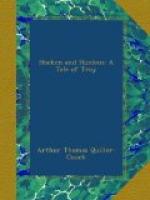“The teachers? And who are the teachers, I’d like to know?—Nasty stuck-up things, if they want the children to keep time, what’s to prevent their calling out ‘One, two—right, left’ like ordinary people? But—oh, dear me, no! We’re quite above that! So it’s tinkle-tum, tinkle-tum, and all out of the rates.”
“But ‘one, two—right, left’ wouldn’ carry ye far in a singin’ lesson,” urged Cai.
“And who wants all this singin’? There’s William Skin, my waggoner, for instance—five children, and a three-roomed cottage—all the children attending school, and regular, too. Pleasant life it would be for William, with all five coming home with ‘The Sea, the Open Sea’ in their mouths and all about the house when he gets home from work! Leastways it would be, if he wasn’t providentially deaf.”
“Is the woman deaf, too?” asked ’Bias.
“No. She believes in Education,” said Mrs Bosenna. “She’s bound to believe in anything that takes the children off her hands five days in the week.”
Cai puckered his brow. “But,” said he, harking back, “I made inquiries, too, who paid for the piano, and was told the teachers had collected the money by goin’ round with a subscription-list an gettin’ up little entertainments. So it doesn’t come out of the rates.”
“You appear to have had your eye on this openin’ for some time,” retorted Mrs Bosenna, with a faint flush of annoyance. She very much disliked being proved in the wrong. “And it’s not very polite of you to contradict me!”
Cai was crestfallen at once. “I didn’ mean it in that light, ma’am,” he stammered; “and I only made inquiries, d’ye see? Bein’ ignorant of so many things ashore. You’d be astonished how ignorant ‘Bias an’ me found ourselves, first-goin’ off.”
“Speak for yourself,” put in ’Bias.
“You should have come to me,” said Mrs Bosenna. “I could have told you all about Education, especially the sort that ought to be given to labourers’ children; and it’s astonishin’ to me the way some people will talk on matters they know nothing about. My late husband made a study of the question, having been fined five shillin’ and costs, the year before he married me, just for withdrawing a dozen children from school to pick his apples for him. As luck would have it, one of them fell off a tree and broke his leg, and that gave the Board an excuse to take the matter up. My husband argued it out with the Bench. ’The children like it,’ he said, ’for it keeps ’em out of doors, and provides ’em with healthy exercise. If Education sets a boy against climbing for apples, why then,’ says he, speaking up boldly, ‘with your Worships’ leave, Education must be something clean against Nature, as I always thought it was. And the parents like it, for the coppers it brings in. And the farmer gets his apples saved. If that’s so,’ says he, ’here’s a transaction that benefits everybody concerned, instead of which the Board goes out of its way to harass me for it.’ The chairman, Sir Felix, owned he was right, too. ‘Bosenna,’ says he, ’I can’t answer you if I would. Nothing grieves me more, sitting here, than having to administer the law as I find it. But, as things are, I can’t let you off with less.’”




